Abortion

Abortion politics are never very far beneath the surface in American life, but every year around the anniversary of the Supreme Court’s landmark Roe v. Wade decision, handed down Jan. 22, 1973, they take center stage.
The annual March for Life on Jan. 22 will draw more than 100,000 demonstrators to Washington. Religious conservatives will march in protest, firm in their belief that abortion should not only be considered a sin, but also a crime.
And religious liberals, though often skeptical about the morality of abortion, will affirm their belief that a decision to end a pregnancy should be left solely to a woman, her doctors, and her conscience.
In the years after Roe v. Wade, most evangelicals came alongside the Roman Catholic Church to oppose legal abortion. Mainline Protestants, at least among denominational elites, strongly advocated for abortion rights, even though mainline clergy are evenly divided on the legality of abortion and do not talk about it much.
But while conservative religious activists at the March for Life and progressive religious leaders supporting the Religious Coalition for Reproductive Choice do speak for a subset of the people they purport to represent, the absolutism of polarized activist elites betrays the more ambivalent views of rank-and-file Americans.
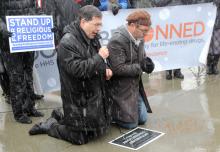
In the latest clash between the Catholic hierarchy and one of the church’s leading anti-abortion crusaders, New York Cardinal Timothy Dolan accused the Rev. Frank Pavone of continuing to stonewall on financial reforms, and Dolan said he is cutting ties with his group, Priests for Life.
In a Nov. 20 letter to other U.S. bishops, Dolan said he did not know if the Vatican would now step in to take action against the New York-based priest, who for years has angered various bishops by rejecting oversight of the organization by church authorities and for refusing to sort out his group’s troubled finances.
“My requests of Father Pavone were clear and simple: one, that Priests for Life undergo a forensic audit; two, that a new, independent board be established to provide oversight and accountability,” Dolan wrote in the letter, which was first reported by Catholic World News.
“Although Father Pavone initially assured me of his support, he did not cooperate. Frequent requests that he do so went unheeded. I finally asked him to comply by October 1st. He did not,” Dolan wrote.
Dolan, who had been asked by the Vatican to help Pavone restructure Priests for Life, said in the letter that he has informed Rome that “I am unable to fulfill their mandate, and want nothing further to do with the organization.”
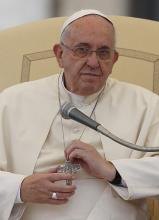
The 77-year-old pontiff is well-known for his attacks on consumerism and for his compassion for the poor. More recently, Francis has turned his attention to bioethics issues, describing abortion, embryonic stem cell research, and euthanasia as “playing with life” and “a sin against God.”
But this was the first time he has delivered his message on the floor of the parliament of the European Union, which represents 500 million people across 28 countries.
As the first non-European pope to hold the office in almost 1,300 years, Francis also appeared less willing to continue the Roman Catholic Church’s traditionally unconditional support for the EU.
As the impact of the stifling economic crisis is being felt in European countries like France and Italy, Francis attacked the EU for a dearth of leadership, saying its ideals had become weighed down by bureaucracy.
“The great ideals that inspired Europe seem to have lost their power of attraction, in favor of the bureaucratic, technical emphasis of its institutions,” the pope said.

Religious groups are battling the state of California over whether employee health insurance plans require them to pay for abortions and some forms of contraception that some find immoral.
So is the state forcing churches to pay for abortions? It depends on who you ask.
The issue gained traction after Michelle Rouillard, director of the California Department of Managed Health Care, sent a letter to Anthem Blue Cross and several other insurance firms in August warning providers that state law requires insurers to not deny woman abortions. “Thus, all health plans must treat maternity services and legal abortion neutrally,” she wrote.
Rouillard wrote that state law provides an exemption for religious institutions.
“Although health plans are required to cover legal abortions, no individual health care provider, religiously sponsored health carrier, or health care facility may be required by law or contract in any circumstance to participate in the provision of or payment for a specific service if they object to doing so for reason of conscience or religion,” she wrote.
“No person may be discriminated against in employment or professional privileges because of such objection.”
However, two legal groups have filed complaints with the U.S. Department of Health and Human Services, alleging the California rule puts faith-based organizations in a position to violate their conscience.


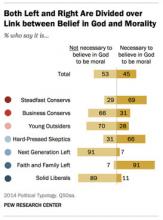
Toss out the party and ideology labels: Republican, Democrat, conservative, liberal.
The Pew Research Center’s new survey, “ Beyond Red VS Blue: The Political Typology,” finds no sharp lines dividing people by their views on politics, faith, family, and the role and limits of government.
“It’s a spectrum,” said Michael Dimock, vice president for research for Pew Research Center.
Looking at questions relating to faith and family, he observed, “the caricature that all religious people are Republican is just not true.”
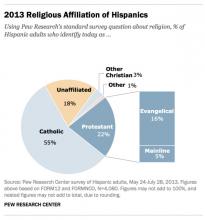
The Pew Research Center’s look at “The Shifting Religious Identity of Latinos in the United States” also examined their beliefs, behavior, and views on social issues. It finds that, beyond the church doors in the lives of the faithful, there are distinct differences between Hispanic evangelicals and Hispanic Catholics:
Catholics are less likely than evangelicals to:
- Attend services weekly — Catholic, 40 percent; evangelical, 71 percent
- Pray daily — Catholic, 61 percent; evangelical, 84 percent
- Take a literal view of the Bible — Catholic, 45 percent; evangelical, 63 percent
- Think abortion should be illegal in all/most cases — Catholic, 54 percent; evangelical, 70 percent
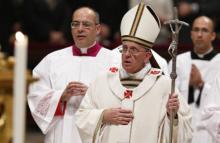
Pope Francis reiterated his strong opposition to abortion on Friday, saying it “compounds the grief of many women” already succumbing to what he called the “pressures of secular culture.”
Francis expressed concern about the challenges the African bishops faced in their communities, from abortion and divorce to violence against women and children.

I don’t know about young girls, but I know from experience that young boys obsess about sex.
They crave it, fantasize about it, do everything in their meager power to obtain it, worry about their adequacy, get confused by their longings, and for the duration of adolescence — and often beyond — see people in terms of “getting laid.”
I suppose this obsession is natural, and that it serves some fundamental purpose, such as perpetuating the species or giving us something to think about besides our gangly bodies, weird thoughts, and being young and insecure.
I don’t know any adult who would willingly repeat adolescence. Yet here we are — we Christians seeking hope, grace, mercy, and purpose, we believers in a God of justice — treating our faith as an endless adolescence centered around sex.

When President Obama and Pope Francis sit down at the Vatican on Thursday, the meeting may well offer a vision of what could have been for Democrats and the Catholic Church over the last six years: a leader of the state and a leader of the church working on the many issues where they agree while working through the issues where they don’t.
Of course, that’s not exactly how it’s gone for Obama and the U.S. hierarchy, even though Obama and the church both stress economic justice and the priority of the common good, universal health care, robust government support for the needy and comprehensive immigration reform.
The potential for a robust alliance fizzled almost from the start of Obama’s candidacy in 2007, and a relationship that began badly went downhill when he was elected.
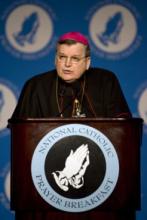
As Pope Francis led the world’s cardinals in talks aimed at shifting the church’s emphasis from following rules to preaching mercy, a senior American cardinal took to the pages of the Vatican newspaper on Friday to reassure conservatives that Francis remains opposed to abortion and gay marriage.
Cardinal Raymond Burke acknowledged that the pope has said the church “cannot insist only on issues related to abortion, gay marriage, and the use of contraceptive methods.” But in his toughly worded column in L’Osservatore Romano, the former archbishop of St. Louis blasted those “whose hearts are hardened against the truth” for trying to twist Francis’ words to their own ends.
Burke, an outspoken conservative who has headed the Vatican’s highest court since 2008, said Francis in fact strongly backs the church’s teaching on those topics. He said the pope is simply trying to find ways to convince people to hear the church’s message despite the “galloping de-Christianization in the West.”
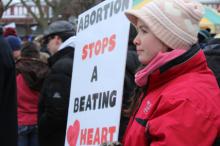
The abortion rate in the U.S. has dropped to its lowest level since the procedure became legal in 1973, according to a new data analysis that reflects a 13 percent decline in both the abortion rate and the number of abortions from 2008 to 2011.
The report being issued Monday by the Guttmacher Institute in New York finds the 2011 rate declined to 16.9 abortions per 1,000 women ages 15-44, second only to 1973, when the rate was 16.3 per 1,000.
Declines were seen in all but six states — Alaska, Maryland, Montana, New Hampshire, West Virginia, and Wyoming — which saw either no change or an increase in abortion rates.

Arriving home from school on Jan. 22, 1973, Mary Wissink noticed her mother was unusually animated.
The dining room table was pulled away from the wall for a festive meal. The linens were ironed. The smell of turkey, dressing, and sweet potatoes wafted through the house. Mom was polishing the silver.
Wissink, then a sophomore in high school, realized her mother had come home from work early to prepare a feast.
“Mary,” her mom said, “today you have the right to your own body.”
It was the day the U.S. Supreme Court affirmed the legality of a woman’s right to an abortion. Wissink and her family have been celebrating Roe v. Wade anniversaries ever since.
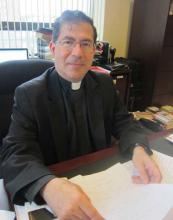
The Rev. Frank Pavone, head of Priests for Life and a leading anti-abortion crusader, was braving freezing temperatures with thousands of others at the annual March for Life on Wednesday, but at least he can look forward to a warm embrace from the Catholic Church.
After years of tensions with various bishops, Pavone has complied with demands to straighten out the group’s finances and to become accountable to his home diocese in New York.
The news came in a December letter sent to the nation’s Catholic bishops by Bishop Patrick J. Zurek of Amarillo, Texas, where Priests for Life has been based for several years.
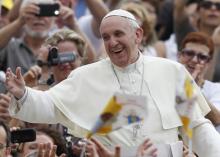
Pope Francis is TIME's Person of the Year. But that is only because Jesus is his "Person of the Day" — every day.
Praises of the pope are flowing around the world, commentary on the pontiff leads all the news shows, and even late night television comedians are paying humorous homage. But a few of the journalists covering the pope are getting it right: Francis is just doing his job. The pope is meant to be a follower of Christ — the Vicar of Christ.
Isn’t it extraordinary how simply following Jesus can attract so much attention when you are the pope? Every day, millions of other faithful followers of Christ do the same thing. They often don’t attract attention, but they keep the world together.
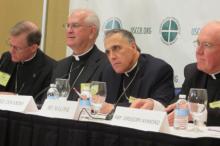
After a closed-door session at their annual meeting in Baltimore this month, the U.S. Catholic bishops issued an unusual "special message" reaffirming their long-standing opposition to the Obama administration’s birth control insurance mandate.
On one level, the declaration and the united front were no surprise: The American church hierarchy has made opposition to the mandate a hallmark of its public lobbying efforts, framing the issue as an unprecedented infringement of religious freedom.
Several bishops even vowed to go to jail rather than comply with the mandate. Others threatened to shutter the church’s infrastructure of hospitals, charitable ministries, schools, and universities rather than accept a policy that they say would force Catholic employers to provide health insurance that covers sterilization and perhaps abortion-inducing drugs as well as contraception.
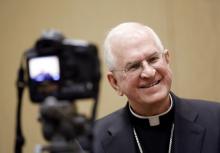
After serving as vice president of the U.S. Conference of Catholic Bishops for the past three years, there was little surprise when Archbishop Joseph Kurtz of Louisville, Ky., was elected this week to the top post in the American hierarchy.
Yet the nearly 250 churchmen would have been hard-pressed to find a better president to help them pivot toward the new, more pastoral path set out in recent months by Pope Francis.
Kurtz has earned his stripes with the hierarchy’s conservative wing thanks to his past work heading their campaign against gay marriage, but he was also molded by his early years as a pastor and his work in social justice — experiences he mentioned early and often when facing reporters after his election on Tuesday.
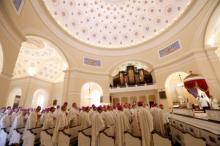
As the U.S. Catholic bishops began their annual fall meeting on Monday, they were directly challenged by Pope Francis’ personal representative to be pastors and not ideologues — the first step of what could be a laborious process of reshaping the hierarchy to meet the pope’s dramatic shift in priorities.
“The Holy Father wants bishops in tune with their people,” Archbishop Carlo Maria Vigano, the Vatican ambassador to the U.S., told the more than 250 American churchmen as he recounted a personal meeting in June with Francis.
The pontiff, he added, “made a special point of saying that he wants ‘pastoral’ bishops, not bishops who profess or follow a particular ideology,” Vigano said. That message was seen as an implicit rebuke to the conservative-tinged activism of the bishops’ conference in recent years.
Almost since his election in March, Francis has signaled that he wants the church to strike a “new balance” by focusing on the poor and on social justice concerns and not overemphasizing opposition to hot-button topics like abortion and contraception and gay marriage — the signature issues of the U.S. bishops lately.
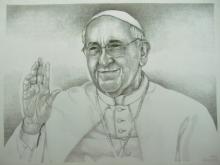
When the nation’s Catholic bishops gather on Monday for their annual fall meeting in Baltimore, one of their chief duties will be choosing a new slate of leaders to guide the American hierarchy for the next three years.
But the more than 200 prelates will also be looking over their heads — and maybe their shoulders — to the Vatican to gauge what Pope Francis’ dramatic new approach means for their future.
If Francis has made one thing clear in his nearly nine months on the job, it is that he wants the church to radically change its tone and style, starting at the top. The pontiff has repeatedly blasted careerism among churchmen and ripped “airport bishops” who spend more time jetting around the globe — and to Rome — rather than being pastors who go out to their flock and come back “smelling of the sheep,” as he likes to put it.